Custom Software Development: What Business Owners Need to Know
August 27, 2024 • 362 Views • 27 min read
Bohdan Vasylkiv
CEO & Co-Founder
In the IT industry, custom software development has many different meanings. For instance, even developing a simple app from scratch can sometimes be considered developing custom software.
For some, custom software solutions development can be a buzzword; for others, it's an exciting idea. The only undeniable fact is that we have to define what is custom software development before making assumptions and deciding whether it is good or bad.
What is the Difference Between Custom Software and Off-The-Shelf Software?
Developing custom software is mainly known as creating a standalone application that offers unique and innovative solutions or features. However, it is commonly confused with developing a conventional app from scratch.
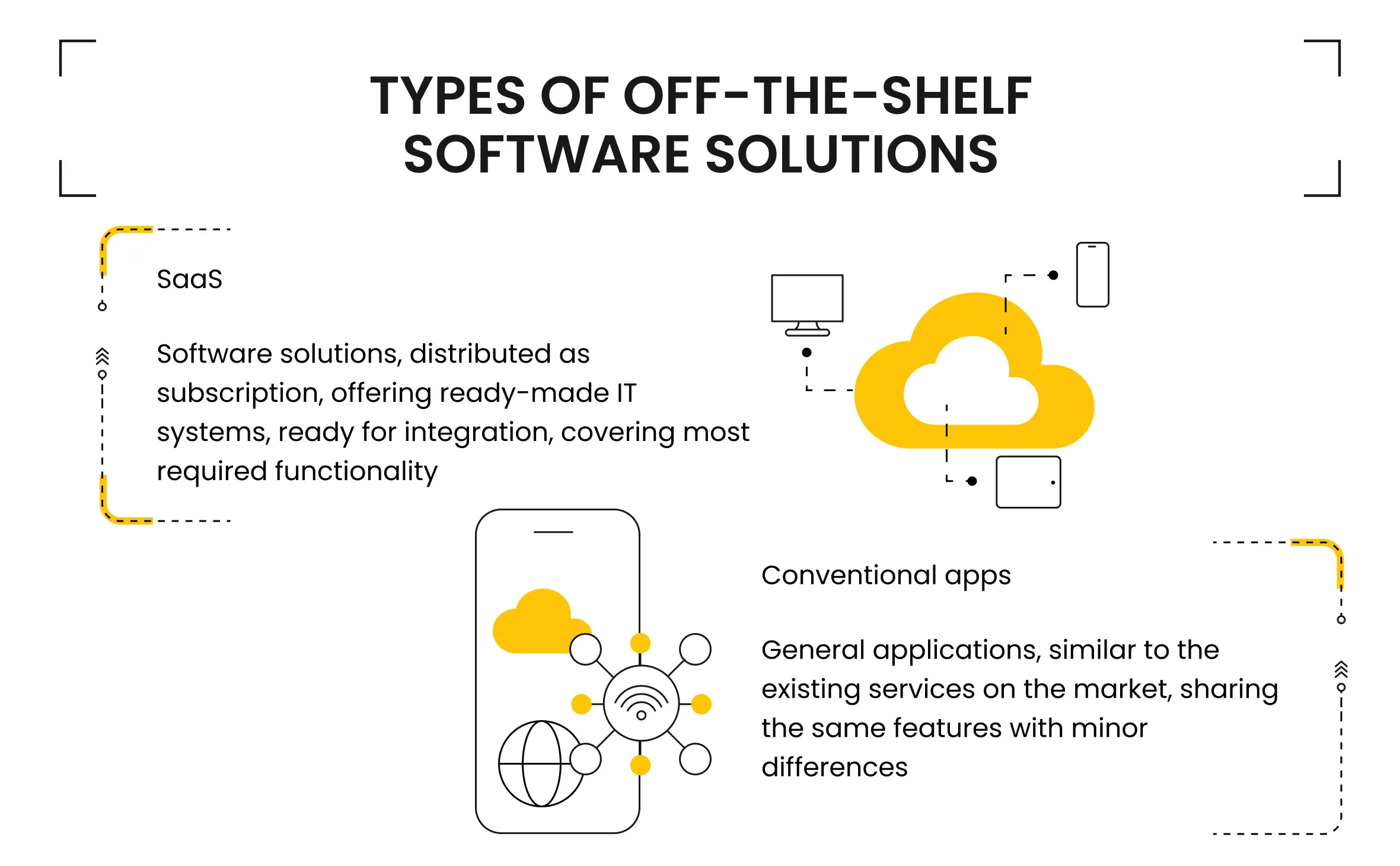
To simplify, a conventional application, even if it is developed from scratch but doesn’t offer new innovative solutions, is hardly custom software development. Custom software development must provide rare features or solutions.
Otherwise, it is a conventional software development, also called off-the-shelf software. Still, off-the-shelf software solutions can also be divided into at least two different types:
- Software-as-a-service solutions (SaaS) are offered per subscription. In such cases, company owners integrate ready-made software into their business processes and pay for this solution.
- Conventional app development from scratch occurs when a business uses dedicated development team services to create its version of existing software applications or other solutions. This version simply embodies the most common features and offers no innovations.
On the one hand, custom software development is challenging and requires much more time and resources. An off-the-shelf solution has predefined features and functionality that can be easily integrated into your business. Moreover, custom software development pricing is higher than integrating a SaaS or choosing off-the-shelf software solutions.
Conversely, it is much more flexible, adjusting to your business's needs. Moreover, it gives you more control over the software, making it much easier to implement changes and scale software on demand. Eventually, it will be much more competitive, giving its owners an advantage over the rivals and bringing innovative and unique features to the market.
Besides, it has various specifics depending on the type of software development and industry you aim at.
Types of Custom Software Development Services
Customized software development offers more benefits due to its unique and personalized approach. It suggests the most suitable solutions to meet your business requirements and limitations.
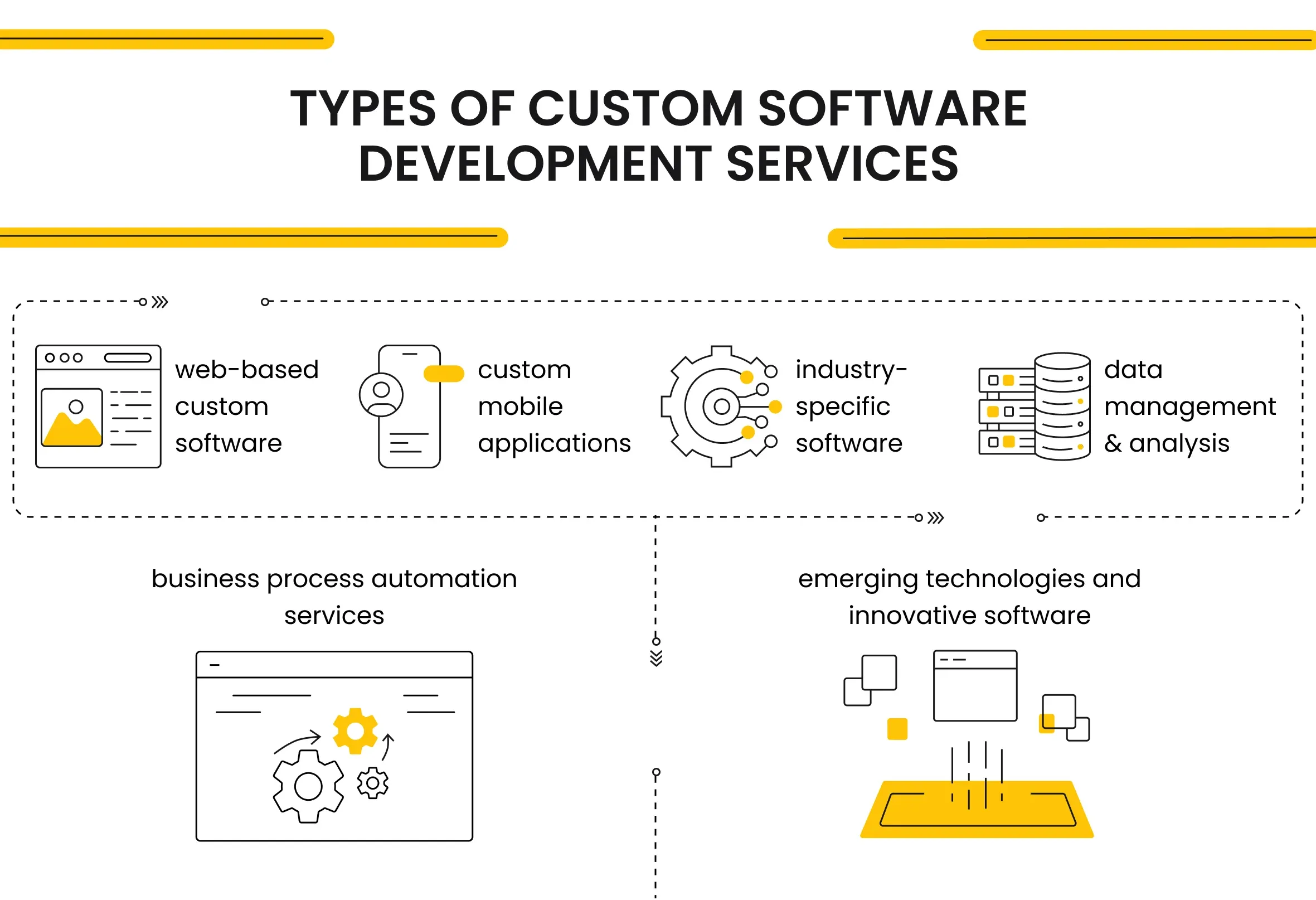
Additionally, it has a variety of practices, depending on the type of software and platforms you need.
Web-based Custom Software
Web app development company will offer you the best tech stack and features to implement for web-based custom software development.
It can differ significantly depending on the business context. For example, to simplify development, speed up this process, and save resources, your technology partner can implement some ready-made elements embodying basic functionality, prioritizing developing unique or innovative features instead.
Alternatively, it can be a fully customized software development, which will take longer and demand extra resources while offering a more personalized and efficient solution.
Most web applications use the same IT infrastructure and development tools under the hood, making the development process cheaper and easier yet limiting the options for further scaling or improvement.
Mobile Application Development
Mobile application development also benefits a lot from customized software development.
In fact, unlike web development, building mobile software offers many more options for integrating innovative solutions. Creating a mobile app is a more complex process that includes many practices and strategies.
Still, this complexity makes implementing advanced features and functionality easier: while web apps mostly require ready-made systems integration to enable certain functionality, mobile application development can only be performed with engaging third-party solutions.
As a result, you can get a chance to develop custom software that will be 100% unique and innovative.
Industry-Specific Solutions
Building custom software is also a popular approach to creating industry-specific solutions.
On the one hand, industry-specific software shares the same built-in features with other applications from the same field. Such must-have features are usually basic and can be easily integrated via API or other third-party solutions. This includes many various features and infrastructure solutions.
Some of your features offer nothing outstanding that rivals do not propose. To stay competitive in the market, you need more than just a fine software product. When you build custom software, high quality is an essential aspect to consider.
The similarity of industry-specific software solutions results in the need to constantly scale functionality and provide users with new-age technologies and features to compete. This is why most niche and industry-specific businesses commonly invest in innovations and their further integration on the software level.
This can be achieved by hiring custom software developers. These niche-experienced experts will, judging from their experience, not only deliver an efficient software solution but also offer the most suited and demanded innovations.
Business Process Automation
IT system custom software development is also essential to business process automation and improvement.
Custom software development is the only possible approach to improving existing business software. When you deal with existing solutions and wish to enhance or upscale them, you must first learn the context of these software solutions.
In other words, each business system improvement is a deeply personalized and unique approach that demands an understanding how under-the-hood processes work and learning the overall business context, goals and demands, challenges, and competitors.
Business process automation is commonly included in IT system custom software development. If you plan a custom CRM development, you will most likely get business process automation as a bonus.
Almost every enterprise-level software is designed and developed as a custom project. Building custom software for such complex enterprise projects is a good idea because it offers flexibility and personalization. It allows for embodying all required metrics, features, etc., making the most of software development.
The enterprise software market shows significant growth, reaching over 1,000 billion US dollars in 2024. So, the custom software development market will also grow.
To sum up, a custom software development project is the most efficient approach to creating a complex IT infrastructure and systems that should be used for decades: custom software solutions development will meet the requirements and expectations at the development stage and provide businesses with complete control over software, making it easier to scale and improve it in the future, integrating new features.
Data Management and Analytics
When working on custom projects, you customize software development and can adjust and shape other supplemental elements like databases, etc.
Therefore, custom software development offers prosperity for data management and other operations, making them more elastic and matching your demands. Data management, storage, and security are usually better than off-the-shelf projects. Additionally, data analytics will be more valuable since your custom software development team requires precise and convenient tools for business analysis.
Business analysis in software development is always an essential part of any project creation. Still, it plays an even more significant role in custom software development, highlighting the most vital aspects to embody or improve.
Thus, custom software developers will use best practices anyway. Yet, when developing an app from scratch, they can integrate valuable tools into your system and show you how to use them properly. As a result, businesses get elevated and built-in data analysis instruments in addition to having an efficient data infrastructure under the hood.
Emerging Technology-Based Solutions
Finally, custom software developers are more aware of emerging innovations in IT and most likely have experience working with such technologies.
To rephrase, during the project discovery phase, when you discuss your ideas with the development team, they can suggest some innovations ready for integration in your project to increase productivity and competitiveness.
One of the most common innovative solutions for businesses is cloud computing, which involves relocating your IT infrastructure to the cloud, making it more secure, faster, and cheaper.
It is also necessary to recognize blockchain technologies and Artificial Intelligence solutions, which are so widespread that finding a built-in variation of various AI modules and virtual assistants in some software apps is no longer surprising.
Still, it doesn’t mean such innovative and custom software development is easy. It demands particular expertise in the niche and experience working with the mentioned technologies.
Custom Software Solutions Across Industries
Сustom software development examples are present in all industries, bringing unique benefits to each field according to its demands and limitations.
Healthcare
Custom software development in healthcare can help automate processes like setting doctor appointments and updating patient data, such as testing results. Still, this is just the tip of the iceberg.
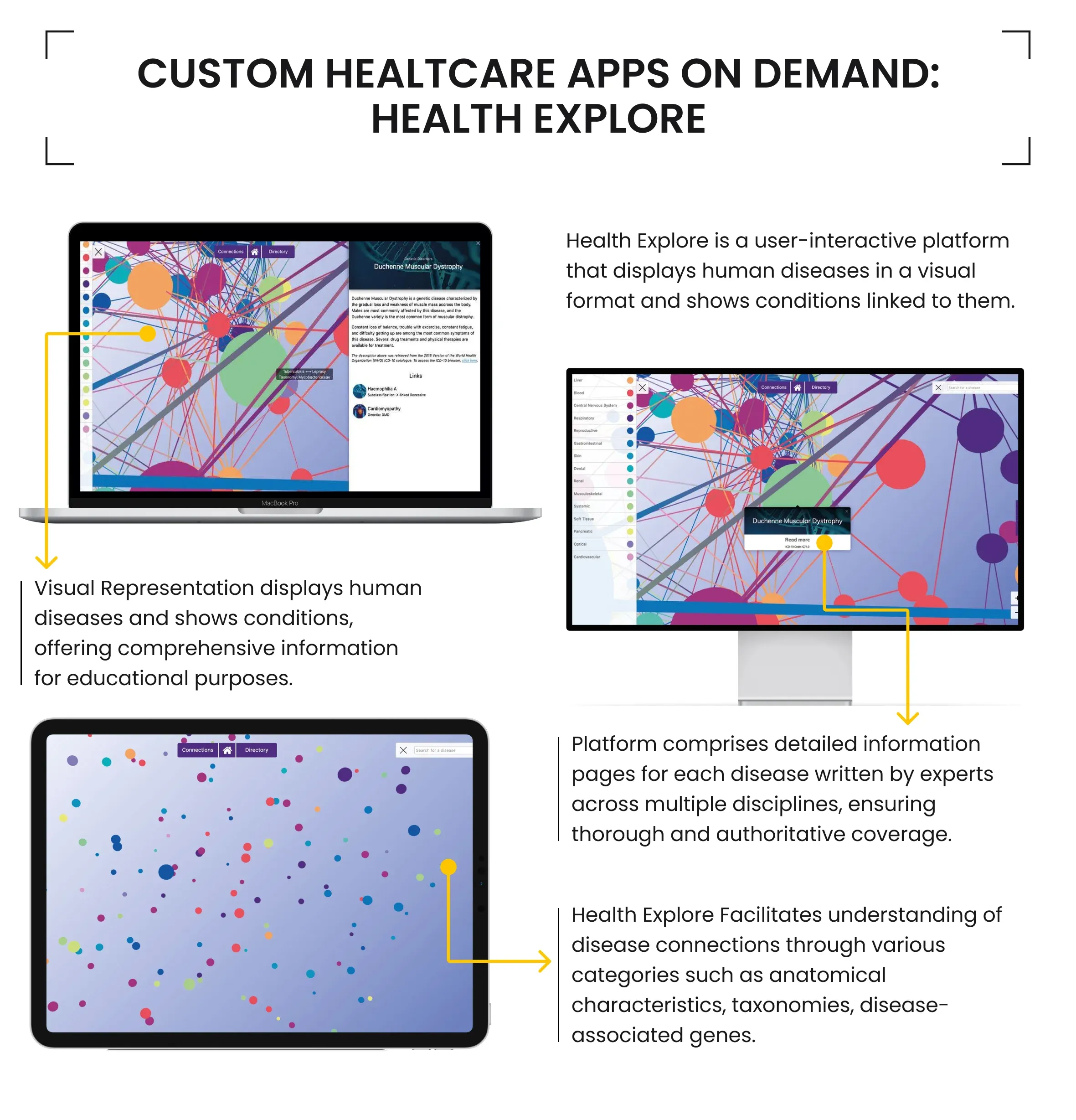
The true advantage of such an approach for healthcare apps is the ability to customize software development and offer uncommon solutions. For instance, Health Explore is an informative platform that shows the interconnections between various diseases and helps people learn which illnesses can cause other complications.
Finance
Custom development in FinTech mainly aims to integrate new-era innovations like AI-driven assistants, blockchain solutions, and other supplemental features. Such applications are only sometimes limited to payments and money transfers.
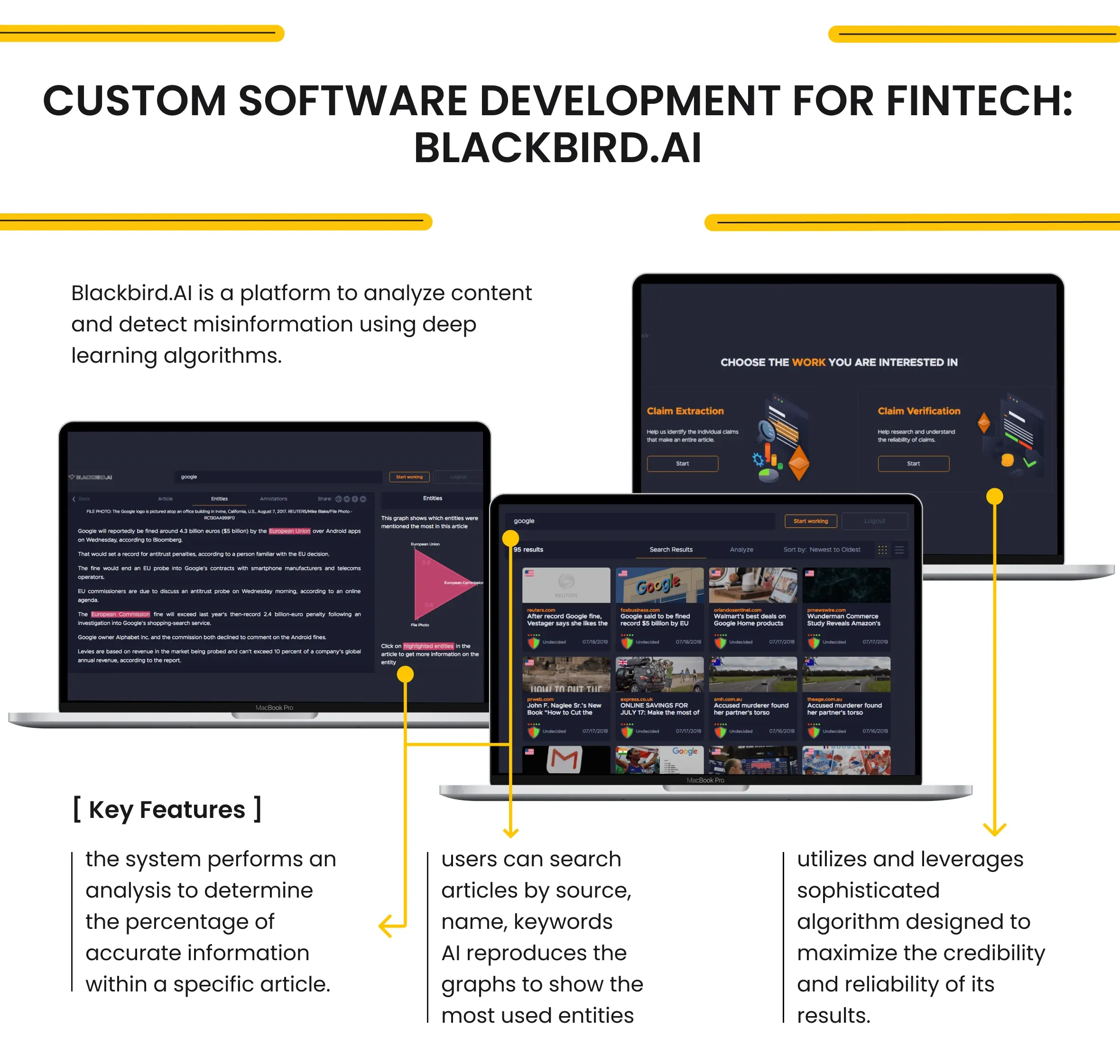
For example, BlackBird.ai is primarily used to clarify the authenticity of information sources and prevent misinformation. To do so, custom software developers embodied distinctive algorithms, partly supported and driven by blockchain solutions.
As a result, this platform offers a vast database of reliable sources rated using sophisticated algorithms.
E-Commerce
Most eCommerce platforms demand development from scratch despite most of them sharing the same features.
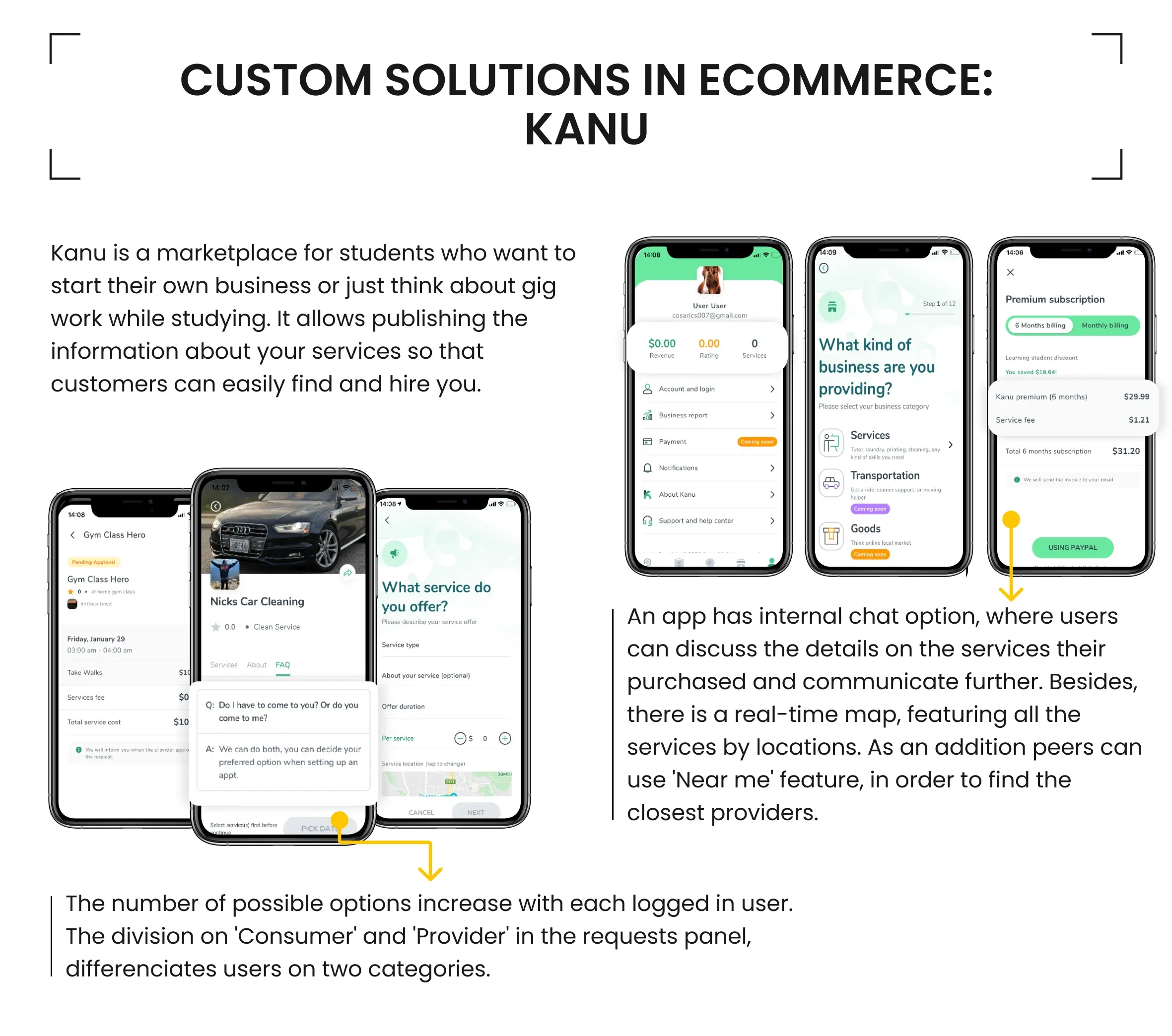
The originality of custom eCommerce platforms can be noticed in their services. Unlike traditional marketplaces, Kanu aims to provide students with working options and support them if they are willing to start their businesses.
Education
EdTech platforms share the exact requirements as eCommerce platforms: you must develop them from scratch. Also, don’t forget about Learning Management Systems (LMS) and other complex custom software development projects. However, there is more space for creativity in this field.
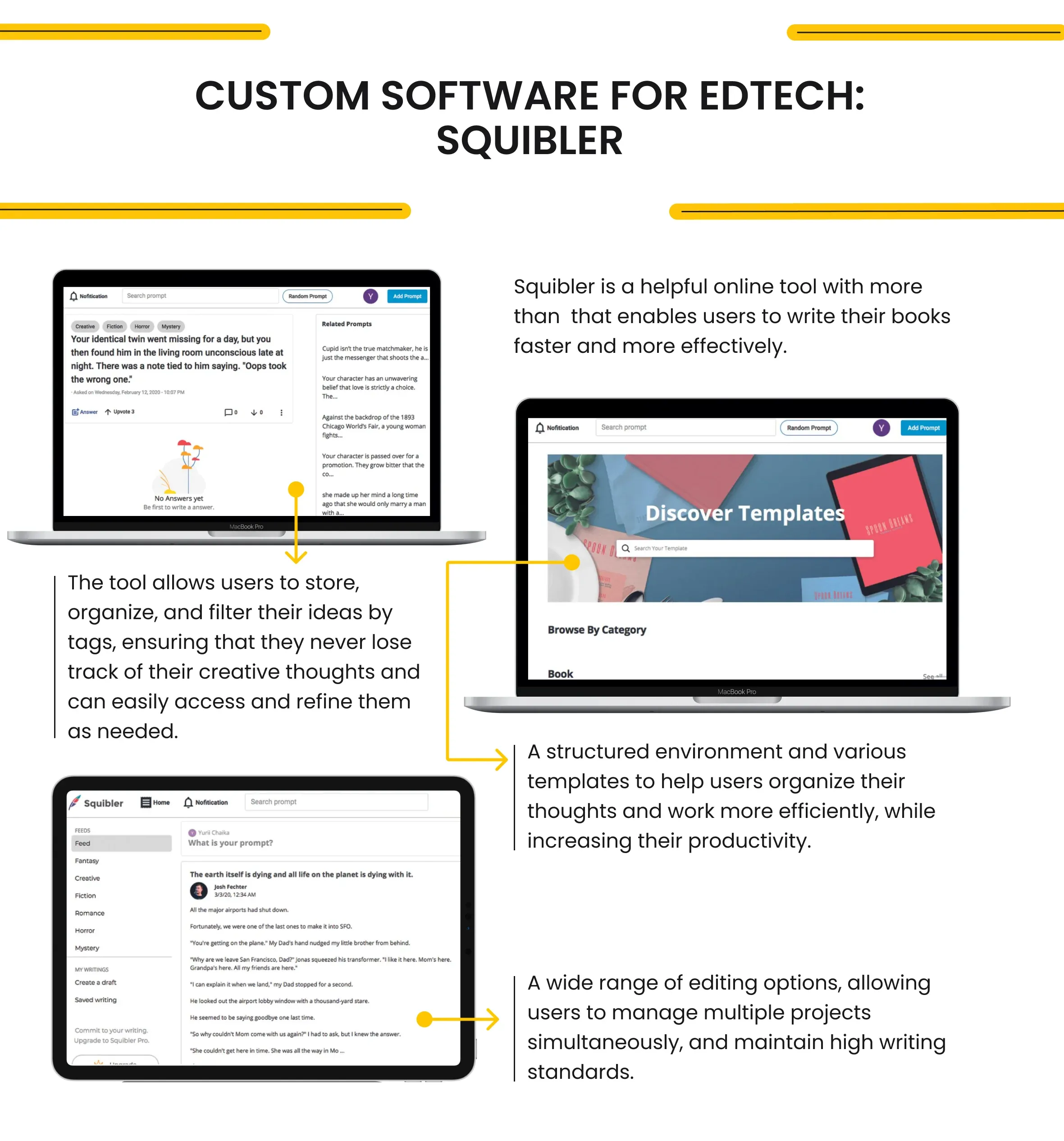
For illustration, Squibler can hardly be defined as an educational platform. However, it offers a variety of supplemental instruments for writers, scenarists, and other specialists who work with texts, helping these individuals to improve their writing skills.
This application has a built-in text editor, suggestions and recommendations, reminders, and many other features.
Logistics
Apart from developing and integrating complex management solutions, such services can help to customize software development like Enviaya.
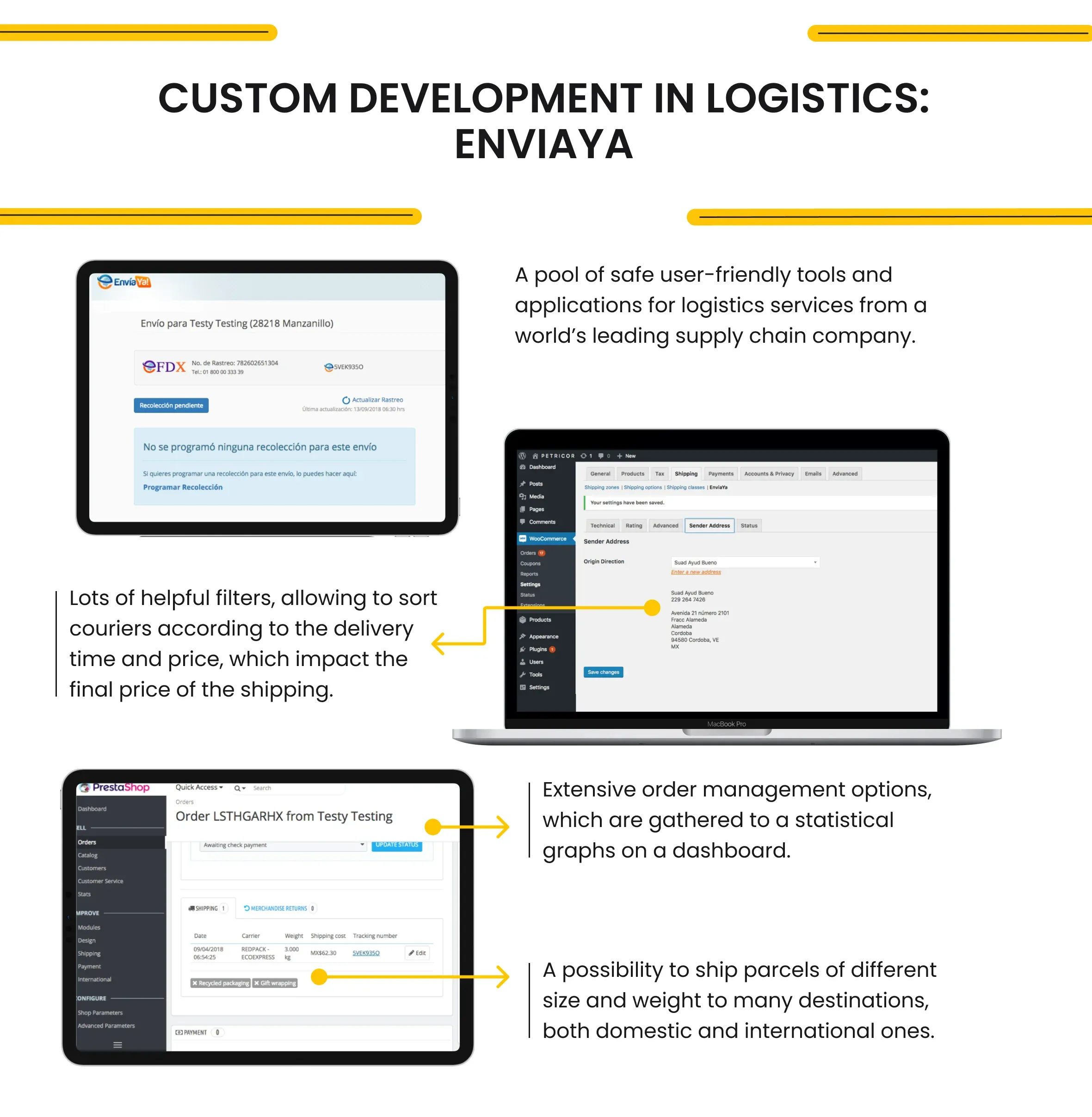
Enviaya is not a standalone application or system but an additional toolset that can be easily integrated into existing logistics software as a plugin. Its primary purpose is to help with shipping automation and information, providing customers with all demanded data on their shipments.
Real Estate
Real estate technology trends are heavily connected to software development. One of the most prominent is the custom business software development of simple construction software.
Therefore, even the smallest construction company can afford helpful and efficient solutions for process automation, enhanced management, and progress tracking.
The variety of construction management software solutions is as wide as that of the other industries, if not broader. For example, if the software is urgent and available resources are limited, such development can stick with Excel tables and Google spreadsheets.
Custom Software Development Process
To make it short, any custom software development process is the same. It doesn’t matter whether you will develop custom software from scratch or customize existing solutions.
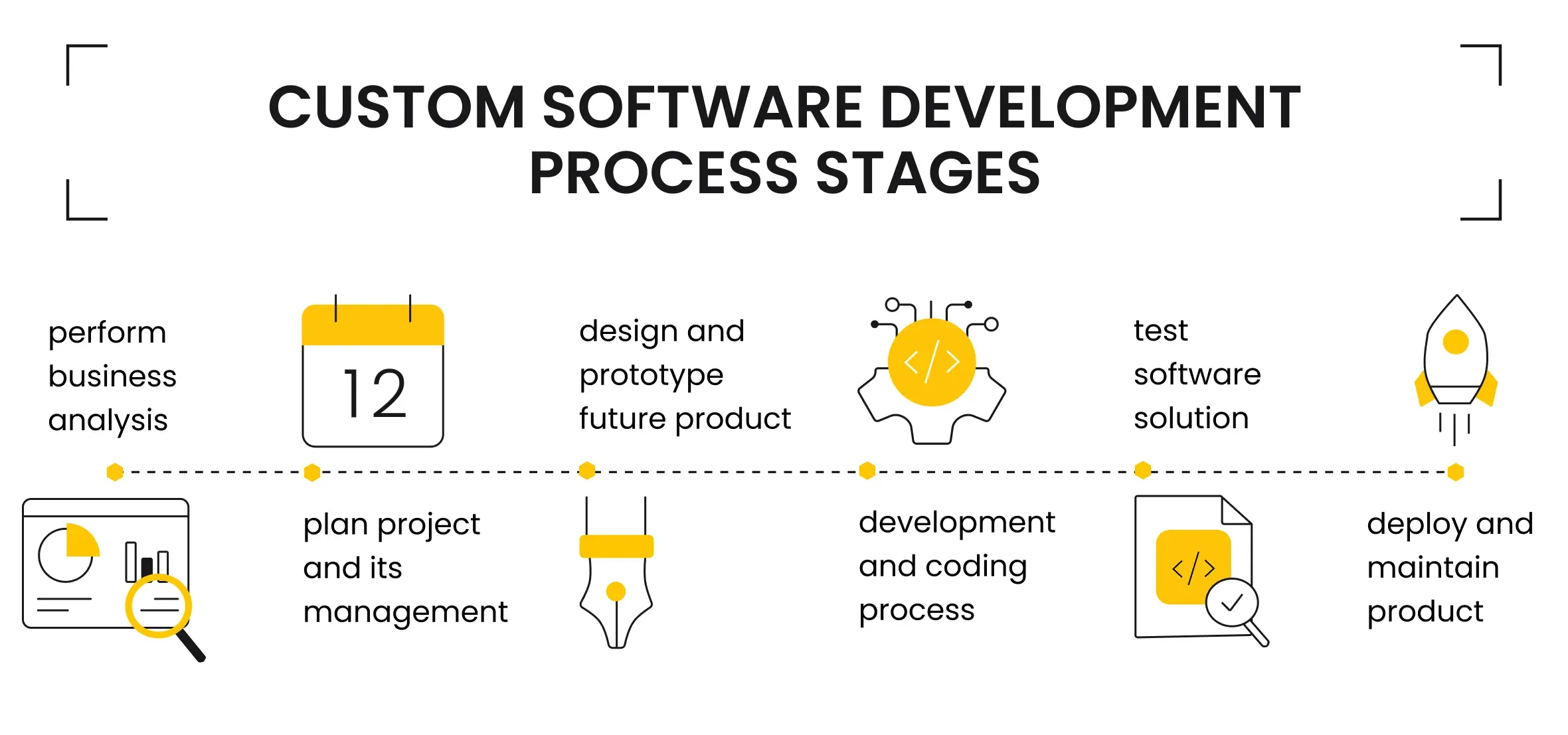
When you build custom software, you have to stay with customized software development stages:
- Business analysis
- Planning and project management
- Design and prototyping
- Development and coding
- Testing and QA
- Deployment and maintenance
The only difference is the complexity and time required for ending each step, depending on development or customizing software.
Business Analysis
Business analysis is an essential part of any custom business software development. Yet, the complexity and scale of this stage highly vary, depending on your goals and needs.
Suppose you aim at customized software development from scratch. In that case, you must first maintain a full-fledged analysis to pinpoint all the aspects and components that require software solutions.
Alternatively, if you want to customize existing software or integrate custom functionality slightly, there is no need for a full-fledged analysis. Unless you want to customize your business software but need help figuring out where to start, this is a surprisingly common case for many businesses: you need more innovations and software improvement but have yet to learn what you are looking for.
The best idea to fulfill this need is to choose CTO consulting as a service. In such a scenario, an experienced Chief Technology Officer on demand will learn your case and suggest the most crucial improvement and technology integrations to achieve success. CTO consulting is also commonly involved in the project planning management stage.
Planning and Project Management
Knowing the project's demands and software requirements can help you plan the development process and choose the best practices for future project management.
This phase includes constant discussions on various topics, such as project budget, scale considerations, roadmap, estimations, etc. The most efficient way is to balance your iron triangle while still fulfilling or scheduling your business needs.
Design and Prototyping
After having an approximate plan for future development, your custom software development team will design and prototype the results to visualize how the software solution will look.
Seeing the product visualization, you can discuss the final details and proceed to development if everyone is satisfied.
Development and Coding
The development and coding stage is when the ideas come to life. At this stage, as a business owner, you must stay updated and track the progress of custom software development.
Still, it is better to keep track of progress with minimal interventions in the development itself. Eventually, you hired custom software developers for their expertise and skills.
Testing and Quality Assurance
Before deploying the code-based software, testing it and checking that the quality meets the bar is essential.
A dedicated QA team hunts for bugs or issues, reporting them to the rest of the team. At the same time, developers fix mistakes that occur and improve software performance and efficiency.
Deployment and Maintenance
Developers can deploy the code after polishing the software solution, ensuring its performance, and meeting expectations.
Still, after going live, an application must be supported and maintained to ensure that all aspects work as expected after the initial deployment. Besides, it is common that when reaching a bigger audience, the development team faces errors, which were missed due to the limited resources and specialists on board.
So, don’t underestimate the post-deployment software support; spend as many resources as needed before integrating new features or scaling the functionality.
Key Considerations Before Investing in Custom Software Development
Custom software development examples are just some of the things worth examining.
Before starting custom business software development, consider a few crucial aspects.
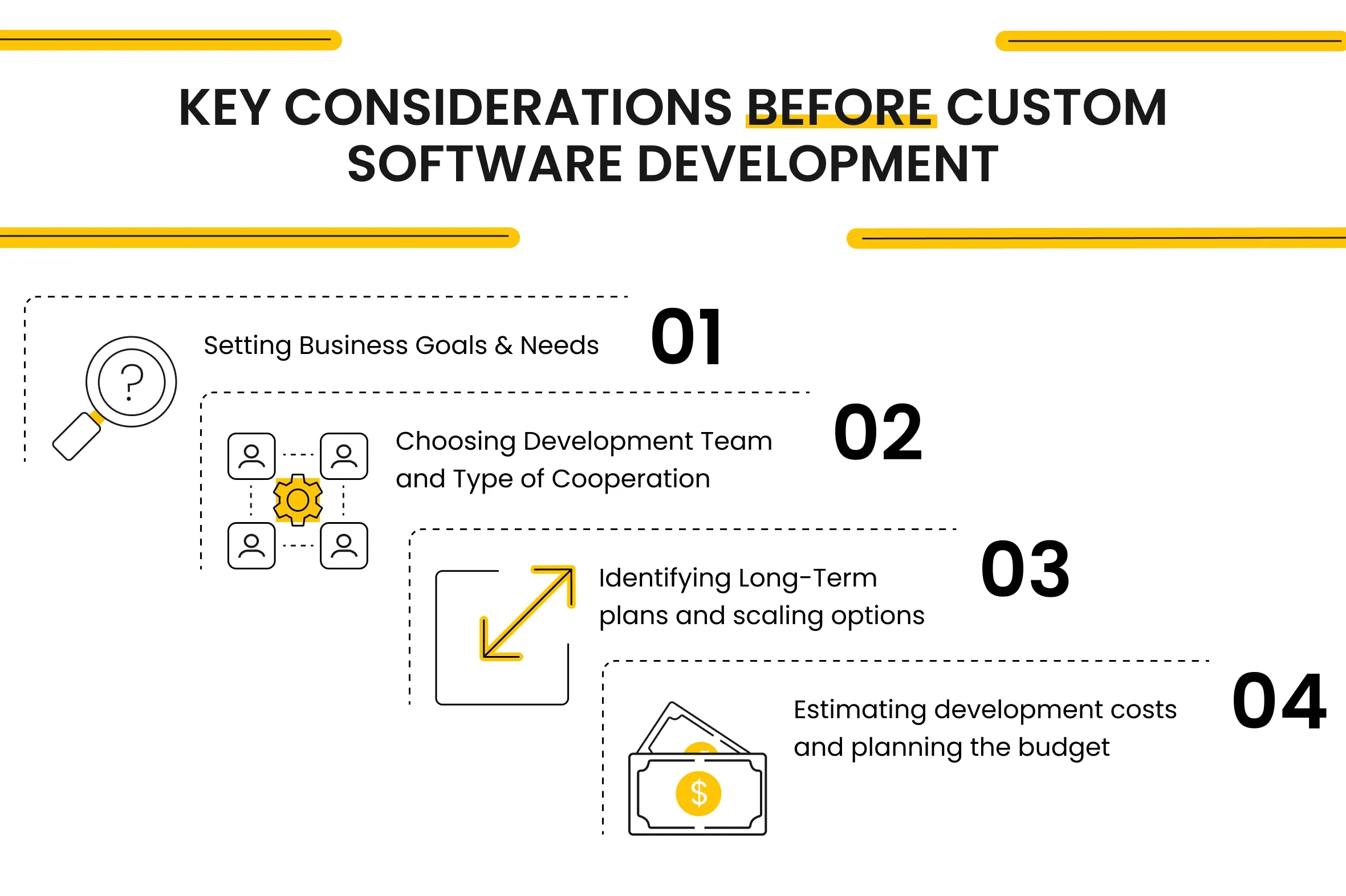
Identifying Your Business Needs: Is Custom Software the Right Tool?
First, you must decide whether custom software development is the right tool to satisfy your needs and expectations.
We are talking not only about unique features or various solutions for your business but also the cost of such development. Sometimes, it might be more beneficial to choose SaaS or other off-the-shelf solutions that meet your needs.
Besides, maintaining a full-fledged development is unnecessary if you are looking for a simple and uncomplicated software solution for a limited time.
Choosing Your Development Team: In-House, Outsourced, or Freelance
Customized software development demands experienced developers on board. There are three main ways to find and hire a custom software development team:
- Gather an in-house team
- Hire outsourced developers
- Find freelance specialists
Each approach has pros and cons and might be the best solution in specific contexts.
For instance, an in-house team is easier to manage and monitor, and security practices are much more complicated and expensive to gather.
Freelancers are popular for short-term projects or when you require niche experience to develop a particular feature. They are much cheaper and the easiest to find. Still, they might lack dedication, and it's hard to check their expertise.
At the same time, dedicated outsourced developers are a golden middle. They are fast and affordable, offer great expertise in various niches, and offer convenient management practices.
Scalability and Long-Term Considerations
As was mentioned before, custom software development is much more flexible and can be adjusted to meet various expectations. Still, if you have plans for future scaling in the long term, then you should warn your development team during the discussion.
Therefore, your developers can use more appropriate coding and development approaches, making implementing new features and scaling IT infrastructure easier.
Moreover, having a better understanding of your plans for the future, dedicated developers can suggest extra options and practices for implementing the desired features someday.
Budget and Cost Estimation
Finally, each development ends with a discussion on budget and cost estimations.
Fortunately, countless ways exist to cut expenses while achieving the planned goal. You can develop an MVP to scale it gradually, build custom software by cutting the unnecessary features, or divide the development into a few stages, maintaining them when your budget allows.
Once again, to choose the best development strategy, you must discuss your ideas and expectations during the project discovery and planning phases and tell the developers your budget.
What’s your impression after reading this?
Love it!
1
Valuable
1
Exciting
1
Unsatisfied
1
FAQ
Let us address your doubts and clarify key points from the article for better understanding.
What is custom software examples?
Custom software examples include:
- CRM Systems - Tailored customer relationship management tools designed for specific business needs.
- E-commerce Platforms - Online stores with unique features and integrations, built for a particular company.
- Enterprise Resource Planning (ERP) - Systems customized to manage all aspects of a company’s operations.
- Mobile Apps - Applications designed specifically for a business's unique processes or services.
- Inventory Management Systems - Custom tools for tracking and managing inventory based on specific requirements.
These examples are typically designed to address the unique challenges of a business, unlike off-the-shelf solutions.
What is the difference between custom and customized software?
The difference between custom and customized software lies in their development approach:
-
Custom Software is built from scratch to meet the specific needs of a particular organization. It's entirely tailored to fit unique requirements, with no pre-existing base.
-
Customized Software is based on existing software that is modified or adapted to meet the specific needs of an organization. It involves altering features, adding modules, or configuring settings to better fit the user’s needs.
In short, custom software is fully unique, while customized software starts from a general solution that is then tailored.
How do I know if my business needs custom software development?
Your business may need custom software development if:
- Unique Requirements - Off-the-shelf solutions don't fully meet your business needs or processes.
- Scalability - You need a solution that can grow and adapt with your business over time.
- Integration Needs - You require seamless integration with existing systems or tools.
- Competitive Advantage - You want to differentiate your business with specialized features or capabilities.
- Security Concerns - You need enhanced security features beyond what's available in standard software.
If these factors apply, custom software may be the best option for your business.
How can custom software help my business stay competitive?
Custom software can help your business stay competitive by:
- Tailored Solutions - Addressing your specific business needs more effectively than generic software.
- Efficiency - Streamlining operations and automating processes, leading to cost savings and faster workflows.
- Innovation - Offering unique features and capabilities that differentiate your business from competitors.
- Scalability - Growing and adapting with your business, ensuring long-term viability.
- Enhanced Customer Experience - Providing a more personalized and efficient service to your customers.
These benefits can give your business a distinct edge in the market.
YOU MAY ALSO LIKE
Let’s talk!
This site uses cookies to improve your user experience. Read our Privacy Policy
Accept
Share this article